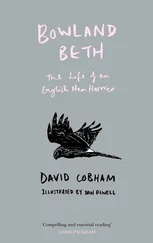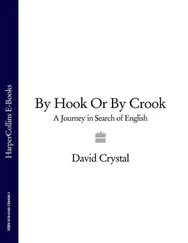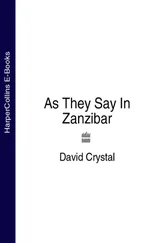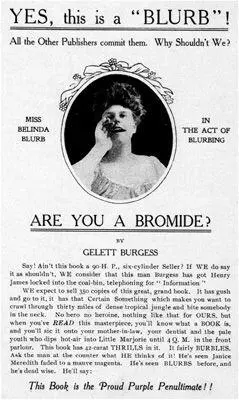
17. The book jacket which introduced the word blurb into the English language in 1906.
The word caught on. Any testimonial for a book, on front or back covers, was soon being called a blurb . In a little wordbook he wrote a few years later, Burgess defined his own term:
A flamboyant advertisement; an inspired testimonial.
Fulsome praise; a sound like a publisher.
And the word has been with us ever since. There is a blurb on the back of this book.
We don’t know the exact moment that Burgess invented the word, but we do know that it began to circulate after that dinner. The same thing happened to the first artificial earth satellite, Sputnik 1, launched by the Russians on 4 October 1957. Before that, the word sputnik (translated as ‘travelling companion’) would have been known only to a small group in the Soviet Union. After the launch, it was everywhere.
The publication of a literary work has been the usual means of establishing the year in which a new word is introduced to the world. Catch-22 arrived in 1961, following the publication of Joseph Heller’s novel of that name. Nymphet , in the sense of a sexually attractive young girl, came in 1955 with Vladimir Nabokov’s Lolita . Chortle appeared first in Lewis Carroll’s Through the Looking-Glass in 1871.
Cases of this kind are the closest we can get to the origins of a word. Usually all we can say is that the word appeared ‘in the early 1960s’ or ‘in the late 14th century’. But the internet is changing everything ( §49). If I activate the appropriate software, it is possible for the date, hour, minute and second at which I create a text to be time-stamped. And if that text happens to contain a new word, or a word in a new sense, its birthday will be known for ever.
 84. Strine — a comic effect (20th century)
84. Strine — a comic effect (20th century)
In 1964 the Sydney Morning Herald carried a story about what had happened to the English author Monica Dickens while she was signing copies of her latest book in a Sydney bookshop. A woman handed her a copy and said, ‘Emma Chisit’. Dickens thought this was the woman’s name, so she wrote ‘To Emma Chisit’ on the flyleaf. The would-be purchaser was puzzled. ‘No. Emma Chisit’, she repeated. Eventually it transpired that what she was saying was ‘How much is it?’ in an Australian accent. And Strine was born.
The story is told at the beginning of Strine: The Complete Works of Professor Afferbeck Lauder (real name: Alistair Morrison). Strine is the supposed Australian pronunciation of the word Australian . Let Stalk Strine was a best-seller when it appeared in 1965, and it’s still in print. It contained such fine examples as ebb tide for ‘appetite’ (as in I jess got no ebb tide these dyes ) and cheque etcher for ‘did you get your’ (as in Where cheque etcher big blue wise? ). The idea caught on, and several compilations of supposed regional dialect speech were published in other parts of the world, such as Lern Yerself Scouse (for the dialect of Liverpool).
Words coined for comic effect don’t usually become a permanent part of the language. If I start speaking in a mock way, putting on a dialect voice or pretending to use an old spelling-pronunciation (such as saying yee oldee tea shoppee ), the effects are of the moment. Nobody would expect oldee to become a recognised pronunciation. But if a humorous form is used often enough, and begins to appear in novels and other literature, then it may well eventually enter the dictionary (with a warning that it is jocular). This is what has happened to stoopid (for stupid ), recorded since Thackeray used it in Vanity Fair (1848), and velly (mock-Chinese ‘very’), first recorded in the 1890s. Thanks to Rudyard Kipling and others, squat-tez-vous (mock-French for ‘sit down’) has achieved some usage. So has el cheapo (mock-Spanish for ‘very cheap’), recorded since the 1950s. They’re all in the Oxford English Dictionary .
Baby-talk can sometimes make its mark: toothy-pegs, wakey-wakey, pussy-cat, beddy-byes, din-din, ickle (‘little’), diddums and oopsie-daisy are all examples of nursery language which adults use when they’re being playful. Comic proper names can get into the language too. Dr Seuss introduced everyone to a grinch in How the Grinch Stole Christmas (1957), and the word is now quite common for a spoilsport or ill-tempered person. Cartoon characters can introduce or popularise a comic word, such as Homer Simpson’s D’oh , Elmer Fudd’s wabbit , the Flintstones’ Yabba dabba doo and Mr Jinx’s I’ll tear you meeces to pieces .
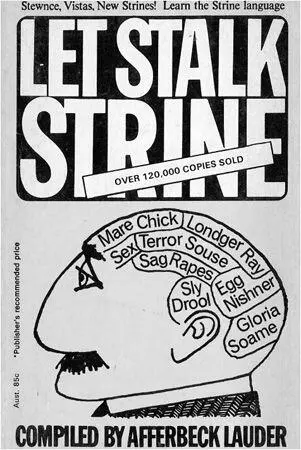
18. The cover of the first ‘strine’ book, published in 1965.
Jocular forms of grammatically irregular verbs also sometimes achieve a widespread use. How often have you heard people say they’re fruz or froz , instead of frozen ? Or: Shakespeare thought every thought that’s ever been thunk . Here too, literature can give these usages a blessing. Mark Twain is one of many whose characters smole a smile . James Joyce used thunk in Finnegans Wake . And so did Tigger in Winnie-the-Pooh .
 85. Alzheimer’s — surname into word (20th century)
85. Alzheimer’s — surname into word (20th century)
Names are important in word-making. We’ve already seen how place-names can make words ( §80) and first names ( §28). Now it’s the turn of surnames.
A remarkable variety of everyday objects come from the names of the people who invented them or who are closely associated with them. We find them in such areas as clothing ( cardigan, leotard, mackintosh ), including hats ( stetson ) and boots ( wellingtons ), food ( garibaldi, pavlova, sandwich ), flowers ( begonia, dahlia, magnolia ), musical instruments ( saxophone, sousaphone ) and guns ( colt, derringer, mauser ). Creative people, especially (if they’re famous enough), can have their surname turn into a general word. Film buffs talk about a movie being Hitchcockian , and similar coinages are found in other areas of the arts, such as Dickensian , Mozartian and Turnerian . Language buffs who admire Henry Fowler’s Dictionary of Modern English Usage have created no fewer than three adjectives to characterise his approach — Fowlerian , Fowlerish and Fowleresque .
Science, in particular, recognises achievements in this way. Think of all the names of physical constants that come from scientists, such as ampere, celsius, hertz, ohm and watt . Many terms in anatomy, physiology and medicine reflect their discoverers, such as the Rolandic and Sylvian fissures in the brain or the Eustachian tube between throat and ear. When diseases are person-named, they are usually shortened. So Ménière’s disease becomes Ménière’s , Parkinson’s disease becomes Parkinson’s and Alzheimer’s disease becomes Alzheimer’s .
Читать дальше
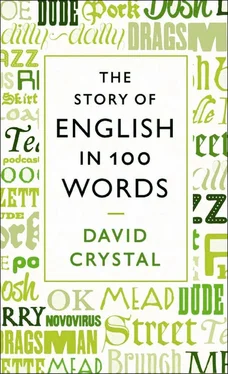

 84. Strine — a comic effect (20th century)
84. Strine — a comic effect (20th century)
 85. Alzheimer’s — surname into word (20th century)
85. Alzheimer’s — surname into word (20th century)



